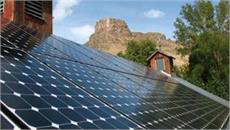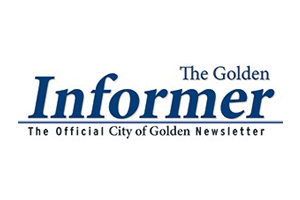Goals
- Renewables: To achieve 100% renewable energy for electricity by 2030 and 100% renewables for heating by 2050. To align Greenhouse Gas Emission reductions with the Paris Accord by 2050.
- Efficiency: To reduce consumption of electricity by 15% by 2030 and reduce consumption of natural gas by 15% by 2030.
- Transportation: To achieve 20% fossil fuel-free transportation section by 2030 and 100% fossil fuel-free transportation sector by 2050.
2019 Greenhouse Gas Inventory Report
This draft report estimates the greenhouse gas emissions of activities occuring within the Golden community such as transportation, building heating and cooling, and waste management. This report is intended to be an update to the previous 2007 GHG Inventory report.
Annual Community Energy Reports
These annual reports, provided by Xcel Energy, show city-wide electricity (kilowatt) and natural gas (therms) usage. Metrics relating to energy sources, consumption, and conservation can be found here.
- 2020 Energy Consumption Report

- 2019 Energy Consumption Report

- 2018 Energy Consumption Report

- 2017 Energy Consumption Report

- 2016 Energy Consumption Report

- 2015 Energy Consumption Report

Hydroelectric Feasibility Study
Funded in part by a grant, the City’s hydroelectric consultant Lindsay George, compiled a report assessing city water infrastructure, waterways, and storage reservoirs for potential hydroelectric generation opportunities.
Planting the Seeds for Golden’s Community Solar Garden
 Golden’s Community Sustainability Advisory Board (CSAB) has been working to bring a community solar garden to Golden for several years. While no specific solar garden project is under consideration at this time, residents may subscribe to one of several community solar gardens currently available in Jefferson County.
Golden’s Community Sustainability Advisory Board (CSAB) has been working to bring a community solar garden to Golden for several years. While no specific solar garden project is under consideration at this time, residents may subscribe to one of several community solar gardens currently available in Jefferson County.
A Community Solar Garden is a photovoltaic (PV) solar system that generates renewable electricity for which utility customers can purchase subscriptions. A Community Solar Garden provides an opportunity for residents and business owners who could not otherwise do so to invest in solar energy production. Specifically, this may be of interest to those who rent their home or business, may not desire a solar installation on their own roof, or whose properties are poorly suited for solar panel installation. At the beginning of 2017, City Council passed Resolution 2546  . The resolution outlines the Guiding Principles for a potential community solar project. More information on potential project sites can be found on the Community Solar Garden page.
. The resolution outlines the Guiding Principles for a potential community solar project. More information on potential project sites can be found on the Community Solar Garden page.
Residential Solar Building Permit Fee Rebates
The City of Golden is now making it more affordable than ever to install solar on residential homes by providing a rebate of fees for solar photovoltaic building permit applications. On March 8, City Council adopted a resolution to rebate the Permit Fee and the Plan Review fees paid for residential solar photovoltaic projects, back to the property owner.
Adopting a recommendation made by the Community Sustainability Advisory Board, City Council stated the rebates will encourage renewable investment by Golden homeowners and help make progress toward the City’s 20% renewable energy goals. The fee rebate program will be available to all residential permits for a period of two years and will be provided upon project completion.
Did you know that solar prices have decreased 70% in the last ten years? Currently, the average cost of owning a solar PV project in Golden is about $12,000 for a 4.5 kilowatt system (about 23 panels) and is typically paid off in 6-7 years. Low interest loans are also available through the State of Colorado’s Residential Energy Loan program.
Solsmart Community
 The City of Golden has been awarded a Silver designation from the national SolSmart program for making it faster, easier, and more affordable for homes and businesses to go solar. This designation recognizes Golden for taking bold steps to encourage solar energy growth and remove obstacles to solar development.
The City of Golden has been awarded a Silver designation from the national SolSmart program for making it faster, easier, and more affordable for homes and businesses to go solar. This designation recognizes Golden for taking bold steps to encourage solar energy growth and remove obstacles to solar development.
SolSmart is a national designation program recognizing cities, counties, and towns that help foster the development of mature local solar markets. For companies looking to expand, a SolSmart Silver designation is a signal that Golden is “open for solar business.” Local governments like Golden have tremendous influence over the prospects for solar energy growth. Soft costs, such as those associated with obtaining a building permit can increase the cost of solar for homeowners and businesses. By streamlining these requirements and taking other steps to encourage solar development, communities can shorten the return on investment and create greater access to renewable energy.
Golden has done this not only through the SolSmart process, but also through another nationally recognized standard: Solar Friendly Communities. SolSmart uses objective criteria to designate communities that have successfully met these goals. These communities receive designations of SolSmart Gold, Silver, and Bronze.
A Solar Pledge
Golden’s Sustainability Initiative has its roots in collaborative process and in 2007 held a series of community meetings to define City-wide goals in vital areas of sustainability. The adopted sustainability goals included City requirements for reducing energy consumption by 20% and producing 50% of the municipality’s total energy consumption by renewable energy by 2017.
 In 2009, the City implemented energy efficiency upgrades for lighting, heating & air conditioning, and automatic controls (occupancy sensors, automatic lighting shut-offs) and the solar thermal system to heat the Golden Community Center pool. In August 2013, solar panels were constructed at nine City facilities, bringing the City’s renewable energy generation to 10 percent of the total electric consumption. Energy production is guaranteed through an energy performance contract with local Golden company, McKinstry Inc., and the project was constructed with local solar installers, Buglet Solar and Golden Solar. The $2.9 million project is projected to be paid back with energy savings over 20 years. The sustainability goals were updated in 2019, aiming to achieve 100% renewable energy for City-wide electricity by 2030 and to reduce consumption of City-wide electricity by 15% by 2030.
In 2009, the City implemented energy efficiency upgrades for lighting, heating & air conditioning, and automatic controls (occupancy sensors, automatic lighting shut-offs) and the solar thermal system to heat the Golden Community Center pool. In August 2013, solar panels were constructed at nine City facilities, bringing the City’s renewable energy generation to 10 percent of the total electric consumption. Energy production is guaranteed through an energy performance contract with local Golden company, McKinstry Inc., and the project was constructed with local solar installers, Buglet Solar and Golden Solar. The $2.9 million project is projected to be paid back with energy savings over 20 years. The sustainability goals were updated in 2019, aiming to achieve 100% renewable energy for City-wide electricity by 2030 and to reduce consumption of City-wide electricity by 15% by 2030.
Mayor Marjorie Sloan called the decision “epic,” and Councilor Bill Fisher stated, “The project demonstrates a good public-private partnership that actually takes advantage of what we do best and what the private sector does best as well.”
City of Golden’s 9 photovoltaic solar systems:
- Public Works Facility
- Tony Grampsas Memorial Sports Complex
- Splash Aquatic Park
- Fossil Trace Golf Course – Illinois St
- Fossil Trace Golf Course – Johnson Rd
- Fossil Trace Golf Course – Maintenance Facility
- Public Works & Planning Administration Building
- Golden Community Center
- Fire Station 24
Colorado Commercial Property Assessed Clean Energy (C-PACE) financing
Jefferson County, including the City of Golden, is a participating party in C-PACE, which enables owners of eligible commercial and industrial buildings to finance up to 100 percent of energy efficiency, renewable energy and water conservation eligible improvements. Financing is provided by private capital providers at competitive rates with repayment terms up to 20 years.
“Commercial buildings currently account for about 20 percent of Colorado’s energy use,” said Paul Scharfenberger, chairman of the New Energy Improvement District board, a statewide district that operates and facilitates the C-PACE program. “Colorado’s commercial PACE program offers a financial tool to help spur energy efficiency and renewable energy investments in our state’s building infrastructure, providing long-term utility savings, while stimulating the economy.”
For more information or to apply for financing, visit the Colorado C-PACE website or contact Golden Sustainability Manager Theresa Worsham at goldensustainabilty@cityofgolden.net or the Jeffco property assessor’s office at assessor@jeffco.us
Effects Of Roofing Shingle Color On Energy Efficiency
The color of the shingles you choose can have a significant impact on the building’s energy efficiency. Attic temperatures can vary as much as 20 to 40 degrees, which in turn can reduce energy consumption by 20%. A study by the United States Department of Agriculture found that wood roofing panels under black shingles were ten to fifteen degrees warmer than the same panels under white shingles on a sunny day. In warmer climates, lighter colors will reduce heat absorption from the sun while cooler climates will want black shingles that help to melt winter snow. You can compromise the shingle color to better suit home design by selecting shingles with flex of white or grey in warmer climates. Consider blends like grays to get the most out of your shingles all year round.
Experts Weigh In On Renewables – 2012
 The Renewable Energy Technical Advisory Committee (RETAC) was a short-term committee established by City Council under City of Golden Resolution No. 2174. After four months of meetings by the RETAC, a final report
The Renewable Energy Technical Advisory Committee (RETAC) was a short-term committee established by City Council under City of Golden Resolution No. 2174. After four months of meetings by the RETAC, a final report ![]() was provided to City council on June 7, 2012.
was provided to City council on June 7, 2012.
RETAC’s Goal – 2012
- To identify a range of potential strategies for achieving the city’s renewable energy goals, for consideration by the community Sustainability Advisory Board and City Council. This also includes recommendations about which the strategies appear to be the most promising for achieving the city’s goals at a reasonable cost.
- To provide advice about leveraging the city’s relationships with the U.S. Department of Energy, the National Renewable Energy Laboratory, and Colorado School of Mines and also about potential collaborations with these institutions to aid in achieving the city’s renewable energy goals.
The Report is divided into four key elements
1. Electricity
- Least-cost options such as buying Renewable Energy Credits (RECs).
- WindSource investment – paying a slight premium for electricity generated by regional wind farms.
- Large-scale solar photovoltaic systems, including community solar gardens, funded through power purchase agreements or aggregating purchases with several government agencies such as Jefferson County or CSM.
- Hydroelectric projects at the City’s reservoirs in Clear Creek County.
- Small-scale wind turbines.
2. Natural Gas
- Solar Thermal, as a green building strategy to reduce water and space heating demand.
- Geothermal, referring to ground source heat pump technology for new and remodeled single structures.
- Biomass, as a potential to utilize MillerCoors waste products or landfill methane capture.
3. Transportation
- Fuel alternatives, including biofuel, electric, natural gas, and propane.
- Consideration for widening public access to alternative fueling stations.
- Vehicle efficiency, such as continuing to optimize the City’s fleet and procurement policies.
4. Energy Efficiency
- If the City is able to meet its energy reduction goals, a lesser investment in renewables is required.
Additional Resources
- Colorado Communities for Climate Action
- Xcel Energy residential programs and rebates
- Colorado Renewable Energy Society
- Golden is a Solar Friendly Communities
- Golden Tour of Solar Homes
- U.S. Department of Energy Home Energy Score
- Energy Star Appliance Ratings
- Solar Action Alliance
- Colorado Commercial Property Assessed Clean Energy (C-PACE)












